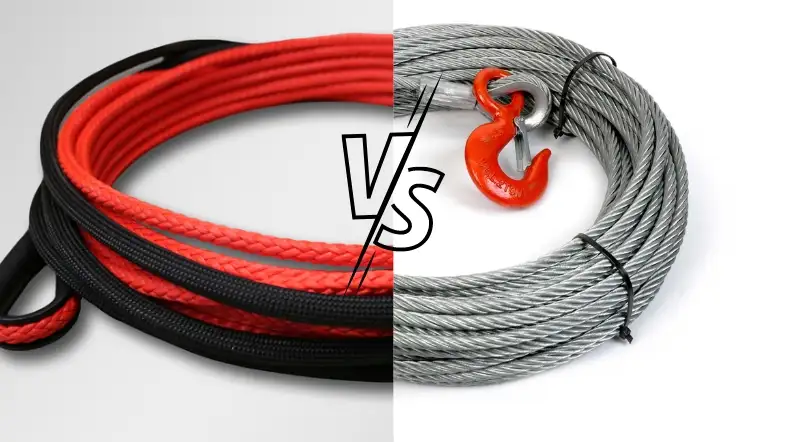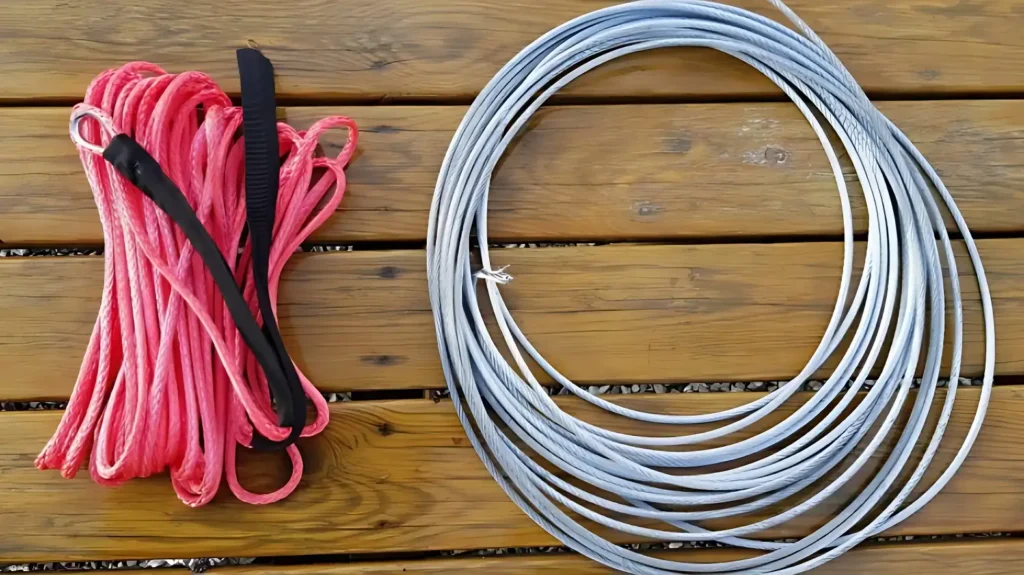When it comes to cable selection, both synthetic and steel cables have their distinct advantages and disadvantages.
Today we will explore the key differences and comparison between the two, such as their strength, durability, cost, safety, and environmental factors.
Which Is Better, Synthetic or Steel Cable?
Steel cable is stronger and more durable than synthetic cable. However, synthetic cable is lighter and easier to handle.

The choice between the two depends on the specific needs of the application.
Comparison of Synthetic and Steel Cable:
| Factor | Synthetic Cable | Steel Cable |
|---|---|---|
| Strength | Up to 10,000 lbs | Up to 19,000 lbs |
| Durability | Moderate | High |
| Weight | Light | Heavy |
| Safety | Safer (does not snap) | Can snap under extreme stress |
| Cost (per 100ft) | $75 – $200 (depending on strength and material) | $100 – $300 (depending on strength and material) |
| Online Stores | Amazon, Walmart, Home Depot, Northern Tool, and Equipment | Amazon, Walmart, Home Depot, Northern Tool, and Equipment |
| Corrosion Resistance | High resistance to corrosion, making it ideal for use in wet and humid environments | Susceptible to rust and corrosion, may require regular maintenance to prevent rust and prolong lifespan |
| Flexibility | Flexible and easy to handle, making it ideal for use in tight spaces or applications where maneuverability is important | Rigid and less flexible, making it more difficult to handle in tight spaces |
| Electric Conductivity | Non-conductive, making it ideal for use in electrical applications where safety is a concern | Conductive, may pose a safety hazard in electrical applications |
| Environmental Impact | Environmentally friendly, as synthetic cable does not contribute to pollution or deforestation | Steel cable is made from non-renewable resources and has a significant environmental impact, including deforestation and air pollution from manufacturing and transportation |
When to Choose Synthetic Cable over Steel Cable?
some of the key factors to consider when deciding between synthetic and steel cables.

Weight Considerations
One of the primary reasons why synthetic cables are becoming increasingly popular is their weight.
Compared to steel cables, synthetic cables are much lighter, making them a better choice for applications where weight is a critical factor.
For example, synthetic cables are often used in marine applications, where the weight of the cable can have a significant impact on the performance of the vessel.
Additionally, synthetic cables are also commonly used in applications such as aviation, where weight is a critical factor for safety and fuel efficiency.
Corrosion Resistance
Another key advantage of synthetic cables is their corrosion resistance. Unlike steel cables, synthetic cables are not susceptible to rust or other forms of corrosion.
This makes them a better choice for applications where the cable will be exposed to harsh environmental condition.
Synthetic cables are often used in offshore drilling rigs, where they can withstand the corrosive effects of saltwater.
Flexibility
Synthetic cables are also much more flexible than steel cables.
This makes them a better choice for applications where the cable needs to bend or flex around corners or obstacles.
For example, synthetic cables are commonly used in winching applications, where they need to bend around pulleys and other obstacles.
Synthetic cables are also used in applications such as cranes, where they need to be able to bend and flex as the load is lifted and moved.
Safety Considerations
Another important factor to consider when choosing between synthetic and steel cables is safety.
Synthetic cables are generally considered to be safer than steel cables, as they are less likely to snap or break under stress.
Synthetic cables are also less likely to recoil or whip if they do break, which can help to prevent serious injuries or damage to equipment.
For these reasons, synthetic cables are often used in applications where safety is a critical concern, such as construction or mining.
Cost Considerations
Finally, it’s important to consider the cost when choosing between synthetic and steel cables.
While synthetic cables are generally more expensive than steel cables, they can often provide better value in the long run.
Synthetic cables are typically more durable and require less maintenance than steel cables.
Synthetic cables can also help to reduce the overall weight of the equipment, which can lead to cost savings in terms of fuel and other operational costs.
When to Choose Steel Cable over Synthetic Cable?

Given below the reasons of choosing steel cable instead of synthetic cable:
Evaluate Your Application Requirements
The first step in deciding between steel cable and synthetic cable is to evaluate your application requirements.
Steel cable is ideal for high-load applications because to its strength, durability, and abrasion resistance.
Synthetic cable, on the other hand, is lightweight, flexible, and has a higher breaking strength than steel cable.
It’s an excellent choice for applications that require low weight and high strength, such as in the marine and aerospace industries.
Consider the Environmental Conditions
The environmental conditions of your project play a crucial role in choosing the right cable.
Steel cable is highly resistant to extreme temperatures, UV radiation, and chemicals, making it an ideal choice for harsh environments.
Synthetic cable, on the other hand, is susceptible to UV radiation, abrasion, and chemicals, making it suitable for indoor or mild outdoor applications.
Evaluate the Cost
Cost is a significant consideration when choosing between steel cable and synthetic cable.
Steel cable is typically more expensive than synthetic cable due to its strength and durability.
However, in some cases, the long-term cost of steel cable can be less than synthetic cable due to its longer lifespan and less frequent replacement.
Consider Safety
Safety is always a top priority in any project, and the choice of cable plays a crucial role in ensuring safety.
Steel cable is more prone to snapping under tension, making it a potential safety hazard if not properly maintained.
Synthetic cable, on the other hand, is less prone to snapping and has a higher energy absorption capacity, making it safer to use.
Frequently Asked Questions
What Are The Main Differences Between Synthetic And Steel Cable?
Synthetic cables are made from materials such as nylon or polyester, while steel cables are made from metal.
Synthetic cables are lighter, more flexible, and less prone to rust and corrosion than steel cables.
However, steel cables are stronger and more durable than synthetic cables.
Which Is Stronger, Synthetic Or Steel Cable?
Steel cables are generally stronger than synthetic cables. Cable strength relies on its material, diameter, and construction.
Which Is More Durable, Synthetic Or Steel Cable?
Steel cables resist abrasion and wear better than synthetic cables.
Synthetic cables can outlast steel cables in marine situations where steel cables rust.
Which Is Safer, Synthetic Or Steel Cable?
Both synthetic and steel cables can be safe when used correctly.
However, synthetic cables are generally considered safer because they are less likely to snap or recoil if they break, which can cause serious injuries.
Which Is More Cost-Effective, Synthetic Or Steel Cable?
The cost of synthetic and steel cables can vary depending on the type, diameter, and length of the cable.
In general, synthetic cables are less expensive than steel cables, but they may need to be replaced more frequently.
Which Is Easier To Work With, Synthetic Or Steel Cable?
Synthetic cables are generally easier to work with than steel cables because they are lighter and more flexible.
They are also easier to splice and knot than steel cables.
Which Is Better For Specific Applications, Synthetic Or Steel Cable?
The choice between synthetic and steel cable depends on the specific application.
Synthetic cables are often used in situations where weight and flexibility are important, such as in marine environments or for lifting lightweight objects.
Steel cables are typically used for heavy-duty applications, such as in construction or for lifting heavy objects.
Conclusion
Selecting synthetic or steel cable is difficult.It depends on your needs and tastes.
Synthetic cables are lightweight, durable, and rust-resistant. Yet, steel cables are stronger and more robust.
Choose a high-quality cable that suits your needs. Synthetic and steel wires can last for years if properly maintained. Your choice, ultimately.
So take your time, investigate, and choose the cable that’s right for you.
